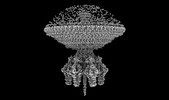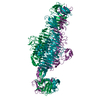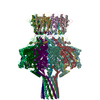[English] 日本語
 Yorodumi
Yorodumi- EMDB-41819: In situ cryo-EM structure of bacteriophage P22 tailspike protein ... -
+ Open data
Open data
- Basic information
Basic information
| Entry |  | |||||||||
|---|---|---|---|---|---|---|---|---|---|---|
| Title | In situ cryo-EM structure of bacteriophage P22 tailspike protein complex at 3.4A resolution | |||||||||
 Map data Map data | ||||||||||
 Sample Sample |
| |||||||||
 Keywords Keywords | Tailspike protein / TSP /  STRUCTURAL PROTEIN / STRUCTURAL PROTEIN /  VIRAL PROTEIN / gene product 9 (gp9) VIRAL PROTEIN / gene product 9 (gp9) | |||||||||
| Function / homology |  Function and homology information Function and homology informationendo-1,3-alpha-L-rhamnosidase activity / symbiont entry into host cell via disruption of host cell envelope lipopolysaccharide / virus tail, fiber / symbiont entry into host cell via disruption of host cell envelope / symbiont entry into host /  Hydrolases; Glycosylases; Glycosidases, i.e. enzymes that hydrolyse O- and S-glycosyl compounds / adhesion receptor-mediated virion attachment to host cell / Hydrolases; Glycosylases; Glycosidases, i.e. enzymes that hydrolyse O- and S-glycosyl compounds / adhesion receptor-mediated virion attachment to host cell /  metabolic process / virion attachment to host cell metabolic process / virion attachment to host cellSimilarity search - Function | |||||||||
| Biological species |   Salmonella phage P22 (virus) Salmonella phage P22 (virus) | |||||||||
| Method |  single particle reconstruction / single particle reconstruction /  cryo EM / Resolution: 3.4 Å cryo EM / Resolution: 3.4 Å | |||||||||
 Authors Authors | Iglesias SM / Feng-Hou C / Cingolani G | |||||||||
| Funding support |  United States, 1 items United States, 1 items
| |||||||||
 Citation Citation |  Journal: J Mol Biol / Year: 2023 Journal: J Mol Biol / Year: 2023Title: Molecular Architecture of Salmonella Typhimurium Virus P22 Genome Ejection Machinery. Authors: Stephano M Iglesias / Ravi K Lokareddy / Ruoyu Yang / Fenglin Li / Daniel P Yeggoni / Chun-Feng David Hou / Makayla N Leroux / Juliana R Cortines / Justin C Leavitt / Mary Bird / Sherwood R ...Authors: Stephano M Iglesias / Ravi K Lokareddy / Ruoyu Yang / Fenglin Li / Daniel P Yeggoni / Chun-Feng David Hou / Makayla N Leroux / Juliana R Cortines / Justin C Leavitt / Mary Bird / Sherwood R Casjens / Simon White / Carolyn M Teschke / Gino Cingolani /   Abstract: Bacteriophage P22 is a prototypical member of the Podoviridae superfamily. Since its discovery in 1952, P22 has become a paradigm for phage transduction and a model for icosahedral viral capsid ...Bacteriophage P22 is a prototypical member of the Podoviridae superfamily. Since its discovery in 1952, P22 has become a paradigm for phage transduction and a model for icosahedral viral capsid assembly. Here, we describe the complete architecture of the P22 tail apparatus (gp1, gp4, gp10, gp9, and gp26) and the potential location and organization of P22 ejection proteins (gp7, gp20, and gp16), determined using cryo-EM localized reconstruction, genetic knockouts, and biochemical analysis. We found that the tail apparatus exists in two equivalent conformations, rotated by ∼6° relative to the capsid. Portal protomers make unique contacts with coat subunits in both conformations, explaining the 12:5 symmetry mismatch. The tail assembles around the hexameric tail hub (gp10), which folds into an interrupted β-propeller characterized by an apical insertion domain. The tail hub connects proximally to the dodecameric portal protein and head-to-tail adapter (gp4), distally to the trimeric tail needle (gp26), and laterally to six trimeric tailspikes (gp9) that attach asymmetrically to gp10 insertion domain. Cryo-EM analysis of P22 mutants lacking the ejection proteins gp7 or gp20 and biochemical analysis of purified recombinant proteins suggest that gp7 and gp20 form a molecular complex associated with the tail apparatus via the portal protein barrel. We identified a putative signal transduction pathway from the tailspike to the tail needle, mediated by three flexible loops in the tail hub, that explains how lipopolysaccharide (LPS) is sufficient to trigger the ejection of the P22 DNA in vitro. | |||||||||
| History |
|
- Structure visualization
Structure visualization
| Supplemental images |
|---|
- Downloads & links
Downloads & links
-EMDB archive
| Map data |  emd_41819.map.gz emd_41819.map.gz | 286.8 MB |  EMDB map data format EMDB map data format | |
|---|---|---|---|---|
| Header (meta data) |  emd-41819-v30.xml emd-41819-v30.xml emd-41819.xml emd-41819.xml | 17.7 KB 17.7 KB | Display Display |  EMDB header EMDB header |
| FSC (resolution estimation) |  emd_41819_fsc.xml emd_41819_fsc.xml | 15.6 KB | Display |  FSC data file FSC data file |
| Images |  emd_41819.png emd_41819.png | 47.4 KB | ||
| Masks |  emd_41819_msk_1.map emd_41819_msk_1.map | 325 MB |  Mask map Mask map | |
| Filedesc metadata |  emd-41819.cif.gz emd-41819.cif.gz | 6 KB | ||
| Others |  emd_41819_half_map_1.map.gz emd_41819_half_map_1.map.gz emd_41819_half_map_2.map.gz emd_41819_half_map_2.map.gz | 259.4 MB 258.9 MB | ||
| Archive directory |  http://ftp.pdbj.org/pub/emdb/structures/EMD-41819 http://ftp.pdbj.org/pub/emdb/structures/EMD-41819 ftp://ftp.pdbj.org/pub/emdb/structures/EMD-41819 ftp://ftp.pdbj.org/pub/emdb/structures/EMD-41819 | HTTPS FTP |
-Related structure data
| Related structure data |  8u1oMC  8tvrC  8tvuC  8u10C  8u11C M: atomic model generated by this map C: citing same article ( |
|---|---|
| Similar structure data | Similarity search - Function & homology  F&H Search F&H Search |
- Links
Links
| EMDB pages |  EMDB (EBI/PDBe) / EMDB (EBI/PDBe) /  EMDataResource EMDataResource |
|---|
- Map
Map
| File |  Download / File: emd_41819.map.gz / Format: CCP4 / Size: 325 MB / Type: IMAGE STORED AS FLOATING POINT NUMBER (4 BYTES) Download / File: emd_41819.map.gz / Format: CCP4 / Size: 325 MB / Type: IMAGE STORED AS FLOATING POINT NUMBER (4 BYTES) | ||||||||||||||||||||
|---|---|---|---|---|---|---|---|---|---|---|---|---|---|---|---|---|---|---|---|---|---|
| Voxel size | X=Y=Z: 1.16582 Å | ||||||||||||||||||||
| Density |
| ||||||||||||||||||||
| Symmetry | Space group: 1 | ||||||||||||||||||||
| Details | EMDB XML:
|
-Supplemental data
-Mask #1
| File |  emd_41819_msk_1.map emd_41819_msk_1.map | ||||||||||||
|---|---|---|---|---|---|---|---|---|---|---|---|---|---|
| Projections & Slices |
| ||||||||||||
| Density Histograms |
-Half map: #2
| File | emd_41819_half_map_1.map | ||||||||||||
|---|---|---|---|---|---|---|---|---|---|---|---|---|---|
| Projections & Slices |
| ||||||||||||
| Density Histograms |
-Half map: #1
| File | emd_41819_half_map_2.map | ||||||||||||
|---|---|---|---|---|---|---|---|---|---|---|---|---|---|
| Projections & Slices |
| ||||||||||||
| Density Histograms |
- Sample components
Sample components
-Entire : Salmonella phage P22
| Entire | Name:   Salmonella phage P22 (virus) Salmonella phage P22 (virus) |
|---|---|
| Components |
|
-Supramolecule #1: Salmonella phage P22
| Supramolecule | Name: Salmonella phage P22 / type: virus / ID: 1 / Parent: 0 / Macromolecule list: all / NCBI-ID: 2908168 / Sci species name: Salmonella phage P22 / Virus type: VIRION / Virus isolate: OTHER / Virus enveloped: No / Virus empty: No |
|---|---|
| Host (natural) | Organism:   Salmonella enterica (bacteria) Salmonella enterica (bacteria) |
-Macromolecule #1: Tail spike protein
| Macromolecule | Name: Tail spike protein / type: protein_or_peptide / ID: 1 / Number of copies: 3 / Enantiomer: LEVO EC number:  Hydrolases; Glycosylases; Glycosidases, i.e. enzymes that hydrolyse O- and S-glycosyl compounds Hydrolases; Glycosylases; Glycosidases, i.e. enzymes that hydrolyse O- and S-glycosyl compounds |
|---|---|
| Source (natural) | Organism:   Salmonella phage P22 (virus) Salmonella phage P22 (virus) |
| Molecular weight | Theoretical: 71.923523 KDa |
| Sequence | String: MTDITANVVV SNPRPIFTES RSFKAVANGK IYIGQIDTDP VNPANQIPVY IENEDGSHVQ ITQPLIINAA GKIVYNGQLV KIVTVQGHS MAIYDANGSQ VDYIANVLKY DPDQYSIEAD KKFKYSVKLS DYPTLQDAAS AAVDGLLIDR DYNFYGGETV D FGGKVLTI ...String: MTDITANVVV SNPRPIFTES RSFKAVANGK IYIGQIDTDP VNPANQIPVY IENEDGSHVQ ITQPLIINAA GKIVYNGQLV KIVTVQGHS MAIYDANGSQ VDYIANVLKY DPDQYSIEAD KKFKYSVKLS DYPTLQDAAS AAVDGLLIDR DYNFYGGETV D FGGKVLTI ECKAKFIGDG NLIFTKLGKG SRIAGVFMES TTTPWVIKPW TDDNQWLTDA AAVVATLKQS KTDGYQPTVS DY VKFPGIE TLLPPNAKGQ NITSTLEIRE CIGVEVHRAS GLMAGFLFRG CHFCKMVDAN NPSGGKDGII TFENLSGDWG KGN YVIGGR TSYGSVSSAQ FLRNNGGFER DGGVIGFTSY RAGESGVKTW QGTVGSTTSR NYNLQFRDSV VIYPVWDGFD LGAD TDMNP ELDRPGDYPI TQYPLHQLPL NHLIDNLLVR GALGVGFGMD GKGMYVSNIT VEDCAGSGAY LLTHESVFTN IAIID TNTK DFQANQIYIS GACRVNGLRL IGIRSTDGQG LTIDAPNSTV SGITGMVDPS RINVANLAEE GLGNIRANSF GYDSAA IKL RIHKLSKTLD SGALYSHING GAGSGSAYTQ LTAISGSTPD AVSLKVNHKD CRGAEIPFVP DIASDDFIKD SSCFLPY WE NNSTSLKALV KKPNGELVRL TLATL UniProtKB: Tail spike protein |
-Experimental details
-Structure determination
| Method |  cryo EM cryo EM |
|---|---|
 Processing Processing |  single particle reconstruction single particle reconstruction |
| Aggregation state | particle |
- Sample preparation
Sample preparation
| Buffer | pH: 7.5 |
|---|---|
| Grid | Model: Quantifoil R2/1 / Material: COPPER / Mesh: 300 / Support film - Material: CARBON / Support film - topology: HOLEY / Pretreatment - Type: GLOW DISCHARGE / Pretreatment - Time: 15 sec. / Pretreatment - Atmosphere: OTHER / Pretreatment - Pressure: 0.015 kPa |
| Vitrification | Cryogen name: ETHANE / Chamber humidity: 100 % / Chamber temperature: 277.15 K / Instrument: FEI VITROBOT MARK IV |
- Electron microscopy
Electron microscopy
| Microscope | TFS KRIOS |
|---|---|
| Electron beam | Acceleration voltage: 300 kV / Electron source:  FIELD EMISSION GUN FIELD EMISSION GUN |
| Electron optics | C2 aperture diameter: 100.0 µm / Calibrated defocus max: 2.1 µm / Calibrated defocus min: 0.8 µm / Calibrated magnification: 29000 / Illumination mode: OTHER / Imaging mode: OTHER / Cs: 2.7 mm / Nominal defocus max: 2.1 µm / Nominal defocus min: 0.8 µm / Nominal magnification: 29000 |
| Sample stage | Specimen holder model: FEI TITAN KRIOS AUTOGRID HOLDER / Cooling holder cryogen: NITROGEN |
| Image recording | Film or detector model: GATAN K3 (6k x 4k) / Digitization - Dimensions - Width: 11520 pixel / Digitization - Dimensions - Height: 8184 pixel / Average electron dose: 1.08 e/Å2 |
| Experimental equipment |  Model: Titan Krios / Image courtesy: FEI Company |
 Movie
Movie Controller
Controller







 Z
Z Y
Y X
X



























